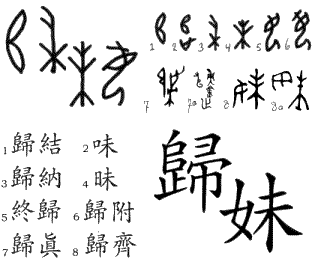Hexagram 53 and 54
53
Picture at top: JIAN4, the ancient character and its parts. The characters at left: words or compounds with JIAN4 Gradually flowing, gradually growing. The characters have more to do with flowing, but jian stands for everything which develops gradually. |
|
Ban Xiang Hu Gua Qian Gua Jiao Gua Pang Tong Gua |
Trigrams mountain wind Nuclear 64 Inverse 54 Reverse 18 Complement 54 |
Hexagram 53 and 54 54 |
|
 |
|
Picture at top: GUI1 MEI4, the ancient character and its parts. GUI1: The character above is composed of (1): mound, or rolling, waving, but the meaning is not certain. It can also mean testes or buttocks, meaning 'military', or it might be some ceremonial object.GUI1: return, go to, bring to, go as a bride to the new home. Zhui1 (2), OB: pursue and attack. 7: OB variant, 7a E-Zhou variant. MEI4: the left side is Wei4: (3 and 4) a picture of a luxuriant tree. Its original meaning was 'abundant', and it is also the 8th Earthly Branch (late summer, animal is sheep). Now its meaning is 'not yet' and my opinion is, that it indicated the time of year when everything was at its maximum development, but fruit were not yet ripe. Also a very good description of a young girl who is almost a woman. Mei-mei: little sister. The right side is a kneeling woman (5), sometimes with emphasis on the head (6). Gui ’return’ also means to die. 8 and 8a: two E-Zhou variants. MEI4: dawn (before sunrise), younger sister. After or below; a secondary wife is also called thus. The characters at left: words or compounds with GUI1 Gui, return, has usually to do with summing up, an end result. Like the end of stories, "and they lived happily ever after". Here it is the beginning of the story: the maiden who submits to her new life as married woman. |
|
Ban Xiang |
Trigrams lake thunder |
